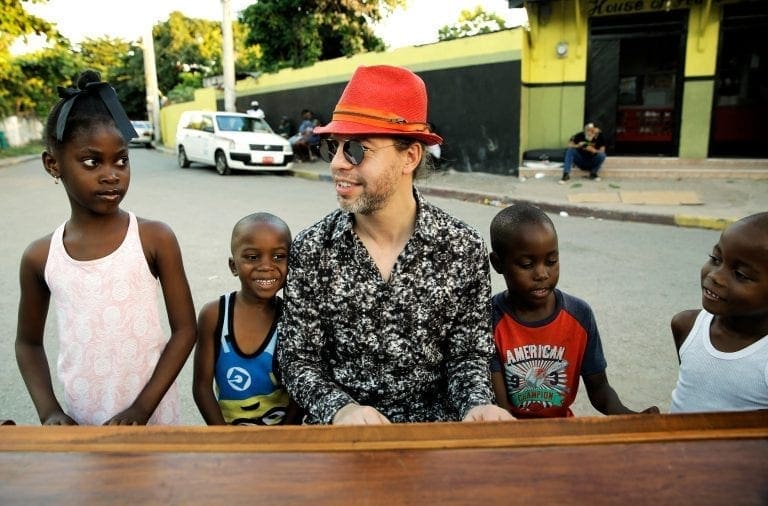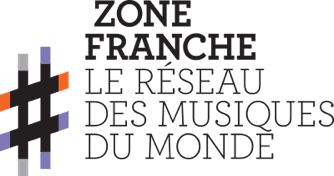On 21 June, music will take over streets across France for the 38th Fête de la Musique [Music Day], an event now celebrated around the world. But what relationships do musicians have with towns and cities? Are they really musical spaces? Which places in particular have inspired them? Musicians with a fondness for travel tell us about their favourite cities.
Fixi’s Paris
From the streets of Kingston to those of Varanasi, from Rio to Lagos… Accordionist Fixi has travelled the world with her music. But when we asked her to tell us about the place that has influenced her the most, she found it impossible to choose. Her memory went back to her childhood, spent in Paris’s 5th arrondissement, then still relatively working class. “I was always out in the street,” she remembers. “The street was where I would meet up with my friends. There was the market, the tramps, the guy who ran the Brazilian restaurant, who played bossa, traders we knew. There was a whole life… I had my drums and my piano and my windows overlooked the street. I remember times in the summer when I had the window open. The piano would “go out” onto the street and people would turn around and look in my direction. I loved this strategy”. The Contre-Escarpe neighbourhood was the first stage for the future musician, for whom the fledgling Fête de la Musique became “the most important time of the year”. “I like it when the street is transformed by a clown, a band or an ambiance, and flaunts itself a bit. Music is a good way to get the street out of its old routine,” says the musician who played from bar to bar before founding the rap-accordion group Java and is the linchpin of the Winston McAnuff and Fixi duo.
Daara J family’s Dakar
In contrast to Paris’s cobblestones, off-limits to musicians except for on 21 June, music in Senegal’s urban spaces is unregulated. The law instead targets talibés, street children forced to beg in the country’s big cities. The contrasts between this extreme poverty and a hyper-connected capital, monster traffic jams and a melting pot of people from all over the country… this is how it is described by Faada Freddy and Ndongo D, the two acolytes of Daara J Family. “Our music breathes Dakar,” believes Ndongo D. “In our song ‘Sénégal’, when we talk about fast cars or yellow and black taxis, taxis-brousses, we know they go a lot slower than the metro. But it’s a way of saying that Dakar wants modernity, that Dakar is reinventing itself. Which doesn’t mean being like New York or Paris. It’s an appeal to authenticity. Having worn-out old cars, that’s its charm”. Pioneers of Senegalese rap in the 1990s, Daara J have enriched their music sung in Wolof with traditional instruments like the kora or the sabar – the emblematic drum used for Senegalese ceremonies and dances – and direct references to their city. The title track of their next album, Yaamatele, due for release in the second half of this year, will blend assikos – rhythms used during the inter-neighbourhood football matches that bring Dakar to life – with trap music.
The Bongo Hop’s Cali
Colombia also celebrates Music Day, although music does not take over all the country’s streets. But in a country with a great fondness for France, it is still an event. Before teaching Political Sciences at the Javeriana, a Jesuit University in Cali, Etienne Savet taught French for a while at the Alliance Française, like many expats who set off in search of adventure in Latin America. During the eight years he spent in this city in the south of Colombia, the African continent became a dream destination for him. The journalist, who has worked for magazines such as World Sound and So Foot, set about raising the profile of afro-beat and Congolese rumba as a DJ among revellers slumming it at the Republica Calicuta nights he organised in tiny bars around the city. The blend of afro-beat and traditional music from the “Colombian Pacific” even became the heart of The Bongo Hop, the group he founded on his return to France, which has just released Satingarona Pt 2, its second album. Etienne says of his formative experience in Cali: “The sounds of the street didn’t influence my music directly, but anchored me in the reality of Colombia. I paid a lot of attention to the sounds of street vendors, knife sharpeners, gas bottle vendors and those selling champus, a typical Cali drink, and tamales, a dish wrapped in corn leaves. They’ve invented a language that lets them signal to each another, a language that even local people don’t understand. There’s even a whole alphabet of whistling in the streets of Cali, with a very elaborate technique, like the shepherds in the Pyrenees”.
Lo’Jo’s busy cities
Denis Péan must have experienced that feeling of needing to understand what’s going on in the places we visit many times on his travels. Since a 1988 tour took them to Soviet Poland, the United States and the island of Réunion, Lo’Jo have visited some fifty countries, and cities he has seen change over thirty years. Both “entirely sedentary”, since settling back in the Anjou countryside where he was born, and a “complete traveller”, Denis Péan muses: “Cities are volatile. They change from one moment to the next and are constantly moving. Natural areas are quieter and evolve at a much slower pace. This leads to customs, ways of life and urban music that we recognise”. Lo’Jo have sung about their meanderings, the market in Vientiane, home to Laos’ “colours”, Algiers, and, more recently, a Paris that bears the memory of France’s “colonial history”. But for its singer – on whom the Au Désert festival, founded alongside the band Tinariwen, has left its mark, as has Georgia – it is first and foremost the quality of the people he meets and the stories inscribed in the places that count. Has the Lo’Jo trailer ever had any particularly amazing encounters? Dozens, including during the Fête de la Musique about ten years ago, when the group shared the stage at the Hermitage Museum in Saint Petersburg with the Russian clowns of the Licedei Theatre. A night when the city, a museum and an event called upon arts and music to come together.


